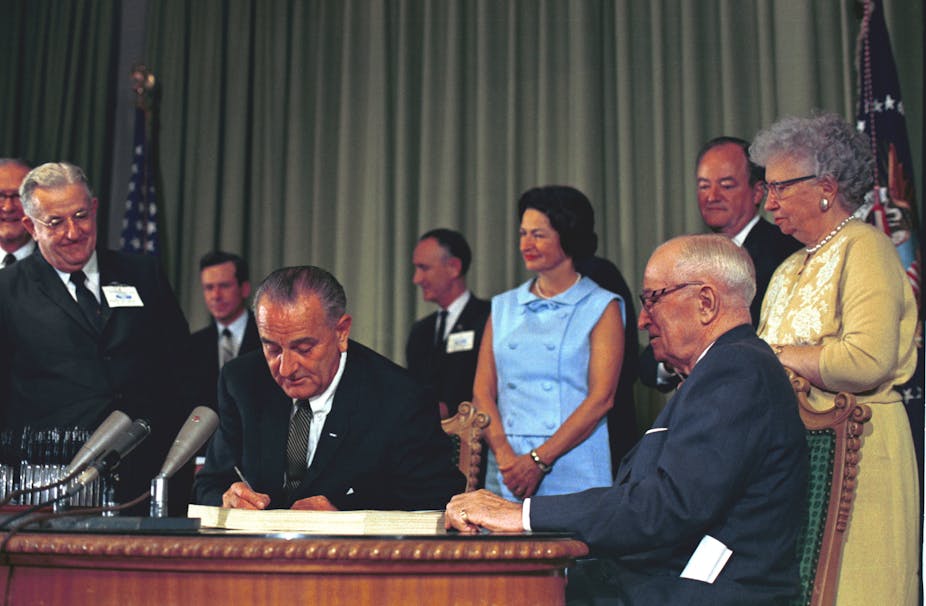2014 marks the 50th anniversary of president Lyndon Johnson’s “War on Poverty” in the United States. Whatever people might think of Johnson’s actions in southeast Asia, it’s worth pausing to remember his other war: to secure a social safety net at home.
Within the space of a couple of years, Johnson introduced the Economic Opportunity Act (1964), the Food Stamp Act (1964), the Civil Rights Act (1964), the Social Security Act amendments creating Medicare and Medicaid (1965) and the Elementary and Secondary Education Act (1965). He increased funding for social security pensions, unemployment compensation, public housing and Aid to Families with Dependent Children.
In the space of five years, official poverty rates in the US dropped from 19% to 12.1%. Child poverty fell from 23% to 14%. But at the end of those five years Johnson was gone and a new war had begun: the war on welfare.
The anniversary comes at a significant time for Australians. While in opposition in 2012, then-shadow treasurer Joe Hockey had promised to end “the age of entitlement” in Australia. The May budget – Hockey’s first as treasurer – is a big step on what may be a long road. But the US is much further down that road, and the Nixon administration started the journey in 1969.
Ending entitlement
Richard Nixon replaced Johnson during a period of severe economic downturn. The escalating Vietnam War effort had pushed the US budget into a US$25.2 billion deficit in 1968, the highest by far since World War Two. Gross federal debt had risen almost 100%, while military expenditures gave rise to inflation, causing the price of US goods to increase and overseas markets to disappear. The US experienced its first stagflation.
Stagflation cast doubt over the prevailing Keynesian theory of demand management. The New Right broke into mainstream economics at this time, offering “small state” solutions. One of this group’s leading figures, Milton Friedman, blamed legal minimum wages and minimum prices, social security programs and “so-called public housing” for the economic crisis.
Friedman consulted to the Nixon administration, while Nixon employed prominent sociologist Daniel P. Moynihan as Head of Urban Affairs. While Friedman linked the economic crisis to the welfare state, Moynihan toured the country explaining that welfare itself was in crisis. He said licentious poverty relief had caused rioting, disorder and the disintegration of (mostly black) American families.
By the time Nixon came up for re-election, anti-welfare rhetoric was a vote winner. His second campaign centred on “small government”, asking voters to choose between welfare cuts or higher taxes. He told his cabinet:
People are for spending … You have to hit on higher taxes. By cutting the budget back, we are avoiding more taxes and that’s the line we have to use.
Nixon dismantled most of the agencies of Johnson’s War on Poverty. Ronald Reagan, also advised by Friedman, made further progress. Bill Clinton, in a show of bipartisanship, set about to “end welfare as we have come to know it” by introducing Workfare and lifetime welfare limits of 60 months under the Temporary Assistance for Needy Families Act.
And now the House Republicans’ 2015 budget wants to claw back government spending by US$5.1 trillion over the next ten years - and 60% of this will come from welfare and training programs for the poor.
Changing the mood
Once citizens lose entitlements, it’s difficult to get them back. Even harder is bringing people back to entitlement, especially if talk of welfare conjures an imaginary straight line to tax hikes, economic crisis and social breakdown.

Barack Obama learnt this the hard way when he pushed through the Affordable Care Act, expanding coverage of Medicaid and providing subsidies for purchasing health insurance, on a sliding scale, for people earning up to 400% of the poverty line. This is hardly the “socialist utopia” Fox News host Bill O’Reilly suggested.
It may seem strange to Australians, but a slight majority of Americans (51%) didn’t want to help the poor purchase health cover. While 91% of black Americans supported the Affordable Care Act, only 29% of white Americans did. Among the common reasons were fear of higher taxes and a belief that there should be “no entitlement to government assistance”.
Lessons for Australia
The debate around welfare is ideological and partisan, no matter what country you’re in. Ideology doesn’t change much. Social democrats support welfare. Neoliberals don’t, or only accept it in a very limited form. Success, either way, depends on the circumstances.
Like Nixon, Hockey is using an economic crisis to achieve cuts to welfare. Only this time there is no economic crisis. If we believe respected economists like Saul Eslake, there’s not even a budget emergency. But that won’t stop the Australian government from pushing.
America may be much further down the road, but it looks like Australia will be heading in the same direction.

